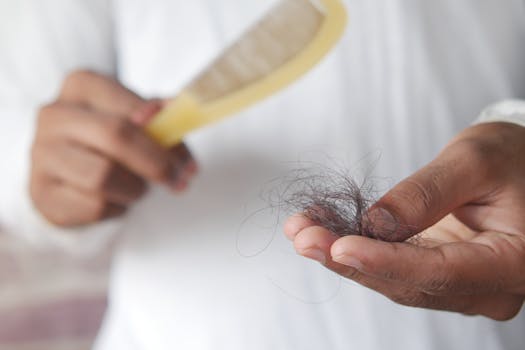Contact Us 720-964-1335 or 901-675-6125
Why Is My Hair Thinning on GLP-1 Weight Loss Medications — And What Can I Do?

Introduction
Hair thinning during weight loss is a frustrating and often alarming experience — especially when it happens alongside the excitement of shedding pounds. If you’re using GLP-1 medications like Ozempic®, Wegovy®, Mounjaro®, or compounded semaglutide or tirzepatide and noticing more hair in the shower or brush, you are not alone. But what’s really going on — and can anything be done about it? Let’s break this down so you can understand the connection and learn how Ample Health & Wellness can help.
Can GLP-1 Medications Cause Hair Thinning?
The medication itself is not directly known to “cause” hair loss in the same way chemotherapy drugs or autoimmune conditions do. However, there is growing evidence and anecdotal reports suggesting that hair thinning can occur indirectly for several reasons when using GLP-1 medications. These side effects are not usually permanent, but they can be distressing if you’re not prepared. Understanding the root causes is the first step in protecting your hair and overall wellness. Let’s explore what’s happening and what you can do to take control:
✅ 🧠 Rapid Weight Loss
Losing weight quickly can place your body under stress and trigger a condition called telogen effluvium. This condition shifts more hair follicles than usual into the resting (telogen) phase of the hair cycle, which results in noticeable shedding. This type of hair loss doesn’t typically happen immediately — it may occur weeks or months after the rapid weight loss begins. While alarming, it is almost always temporary and reversible once your body adapts. Recognizing the signs early can help you take proactive steps to minimize its effects.
✅ 🥗 Reduced Nutrient Intake
GLP-1 medications are effective because they curb appetite, but that can also mean you’re eating less — and possibly missing key nutrients. If your protein intake drops too low or you’re not getting enough iron, zinc, B vitamins, or essential fatty acids, your hair may suffer. These nutrients play critical roles in maintaining strong, healthy hair growth. Low overall calorie intake can also stress the body, making hair loss more likely. Even with suppressed appetite, it’s important to be intentional about meeting your nutrient needs.
- Inadequate protein intake
- Insufficient iron, zinc, and B vitamins
- Low overall calorie intake (which stresses the body)
All of these nutrients are essential for hair growth.
✅ 😰 Stress and Hormonal Changes
Chronic stress — whether emotional or physical — can disrupt your hormones and impact the hair growth cycle. Starting a new medication, navigating rapid weight loss, or managing life stressors can all take a toll. When cortisol levels are elevated for long periods, it can interfere with the normal function of your hair follicles. Many women on GLP-1 medications are simultaneously dealing with midlife hormonal shifts, which can intensify the issue. Managing stress through consistent self-care is critical for your hair, health, and well-being.
What You Can Do to Protect and Restore Hair Health
If you’re noticing more hair in the shower or on your brush, don’t panic — in most cases, this thinning is temporary and treatable. The goal is to support your body with the nutrients, routines, and stress relief it needs to stabilize. Below are specific strategies that can help you protect and restore healthy hair while continuing your weight loss journey with GLP-1 medications.
1️⃣ Prioritize Protein Intake
Protein is the building block of keratin, the key structural protein that makes up your hair. When your body is low on protein, it prioritizes essential organs over hair production, which can lead to shedding. Aim for at least 1.0 to 1.2 grams of protein per kilogram of body weight per day to support both weight loss and hair retention. Include quality sources like eggs, fish, lean meats, tofu, Greek yogurt, and protein shakes. Spacing protein throughout the day helps ensure it’s properly absorbed and utilized.
- Aim for at least 1.0-1.2 grams of protein per kilogram of body weight daily.
- Include high-quality sources like eggs, chicken, fish, tofu, Greek yogurt, and protein powders if needed.
2️⃣ Fill Nutrient Gaps with Supplements
Even when you’re eating well, you may still miss important vitamins and minerals needed for healthy hair. Supplements like biotin, zinc, B-complex vitamins, collagen peptides, and iron (if medically appropriate) can be beneficial. These nutrients support hair follicle health, collagen production, and circulation to the scalp. At Ample, our clients receive access to a curated dispensary through Fullscript, which offers professional-grade supplements for hair and overall wellness.
- Biotin and B vitamins
- Zinc and Iron (check with your doctor first)
- Collagen peptides (support skin and hair structure)
Ample Health & Wellness clients have access to our Fullscript Dispensary with high-quality supplements that can be tailored for hair and scalp health needs.
👉🏾 Ample’s Fullscript Dispensary – Start Here
3️⃣ Avoid Crash Dieting or Undereating
While appetite suppression is a normal side effect of GLP-1 use, consistently eating too little can do more harm than good. Skipping meals or following ultra-low calorie diets deprives your body of the fuel it needs to function properly, including supporting hair health. Focus on balanced, nutrient-dense meals even if they’re smaller in portion. Try to include protein, healthy fats, fiber, and micronutrients at every meal. If you’re unsure how to structure meals, Ample’s coaching programs can guide you through it.
- Do not skip meals
- Avoid very low calorie diets
- Focus on nutrient-dense whole foods
4️⃣ Manage Stress Effectively
Chronic stress not only impacts your mood — it directly affects your hair. Learning to manage stress through daily wellness practices is a powerful way to protect your scalp and follicles. Incorporate simple routines like deep breathing, meditation, gentle stretching, or time outdoors to lower cortisol and improve emotional regulation. Our 28-day Meditation Program is a great way to build this into your lifestyle and feel better from the inside out.
- Deep breathing exercises
- Gentle movement or yoga
- Mindfulness and meditation practices (Ample’s Meditation Program is a perfect fit! Click Here.)
5️⃣ Consider Topical or Professional Treatments
Sometimes external support is needed to complement your internal changes. Consider scalp massage to improve circulation, or speak to a dermatologist about topical serums or treatments that support regrowth. In some cases, your healthcare provider may recommend lab work to check for underlying nutrient deficiencies or hormonal issues. You don’t have to figure this out alone — our team at Ample is here to walk with you every step of the way.
- Scalp massage to boost blood circulation
- Dermatologist-approved hair regrowth serums (if needed)
- Consultation with your healthcare provider if hair loss becomes severe
Will My Hair Grow Back?
Yes — in most cases, hair shedding from telogen effluvium is completely reversible. As your body stabilizes from the initial weight loss, hormone fluctuations, and nutrient adjustments, your hair growth cycle will gradually return to normal. Regrowth often begins within 3 to 6 months, though it may take time to notice visible changes. Stay consistent with nutrition, stress management, and care routines. Be patient and trust that healing is happening under the surface, even if results aren’t immediate.
How Ample Health & Wellness Can Help
At Ample Health & Wellness, we take a full-body, inside-out approach to weight loss. Our programs are not just about medication or numbers on a scale — we care about your energy, confidence, skin, and yes, your hair.
Through our holistic services, you’ll gain:
✔️ Customized nutrition and meal planning to meet your goals
✔️ High-quality supplement recommendations through Fullscript
✔️ Tools for managing stress, sleep, and mindset
✔️ Guidance through unexpected challenges like hair thinning
Your wellness should never come at the cost of your confidence. If you’re navigating side effects on your GLP-1 journey, let Ample be your support system in restoring balance and results you feel good about — inside and out.
👉🏾 Learn More About Our Programs and How to Get Support — Click Here: amplehealthandwellness.com
Final Thoughts
Hair thinning during weight loss can be surprising and upsetting, but it’s a common and temporary phase for many women using GLP-1 medications. The key is to nourish your body well, manage stress wisely, and act early with a holistic plan. At Ample Health & Wellness, we help you do all of that — and more.
Your journey is not just about losing weight. It’s about creating a life and lifestyle where you can look and feel your best every day — without sacrificing your health to get there.

About the Author: Written by Dr. Kisha Pickford, DNP, a Nurse Practitioner and Certified Holistic Nutrition Weight Loss Coach at Ample Health & Wellness. She helps women 40+ achieve sustainable weight loss and whole-body wellness.
📚 References
Freeman, L. M. (2022). Telogen effluvium and the rapid weight loss connection: A clinical review. Dermatology Times, 43(7), 20-24.
Malkani, N., & Fine, R. (2023). Nutritional deficiencies in patients using GLP-1 receptor agonists for weight loss. Nutrition in Clinical Practice, 38(1), 84–92. https://doi.org/10.1002/ncp.10843
Wang, H. J., & Zhou, P. (2021). Psychological stress and hair loss: The role of stress hormones in hair follicle function. International Journal of Dermatology, 60(8), 970-975. https://doi.org/10.1111/ijd.15411
